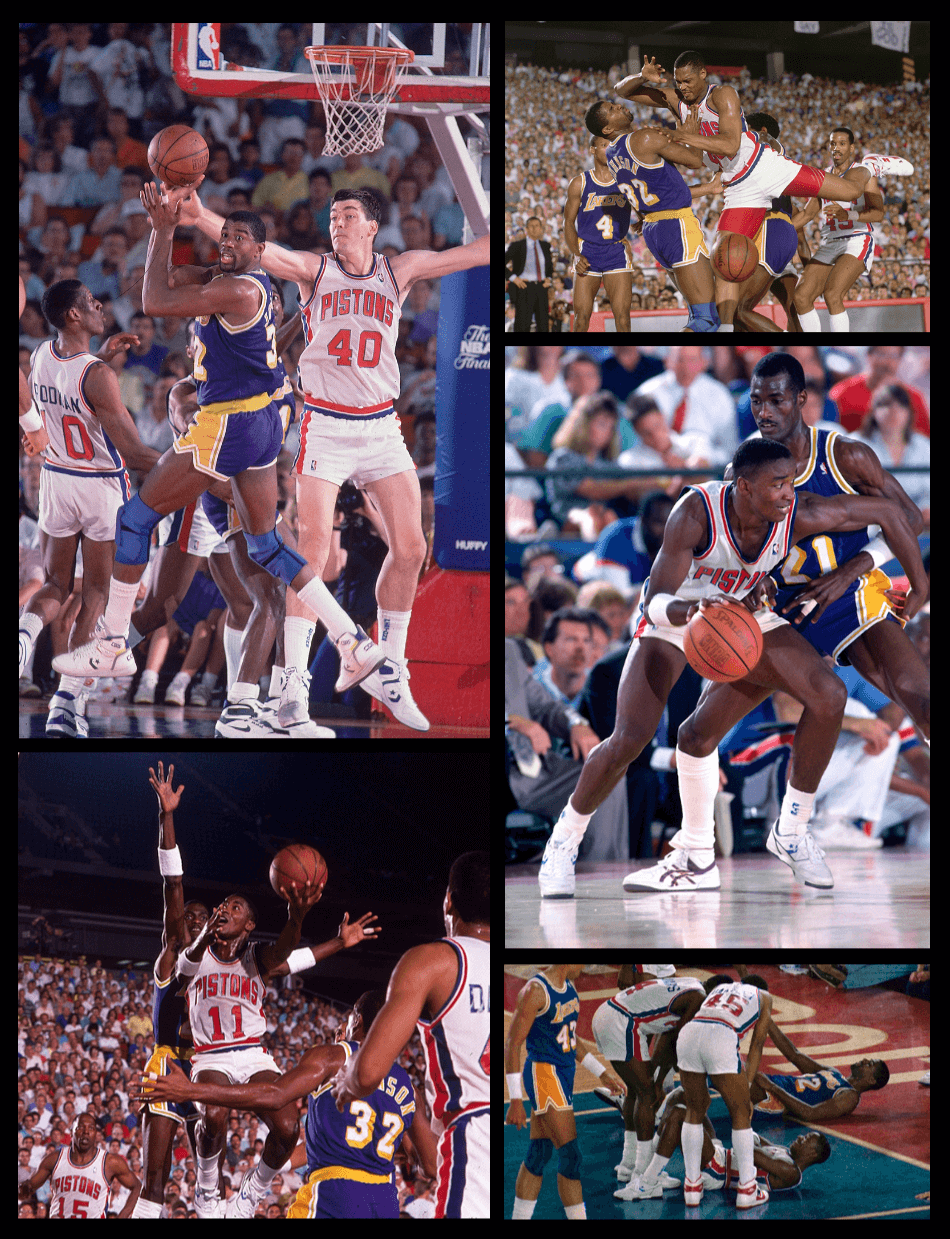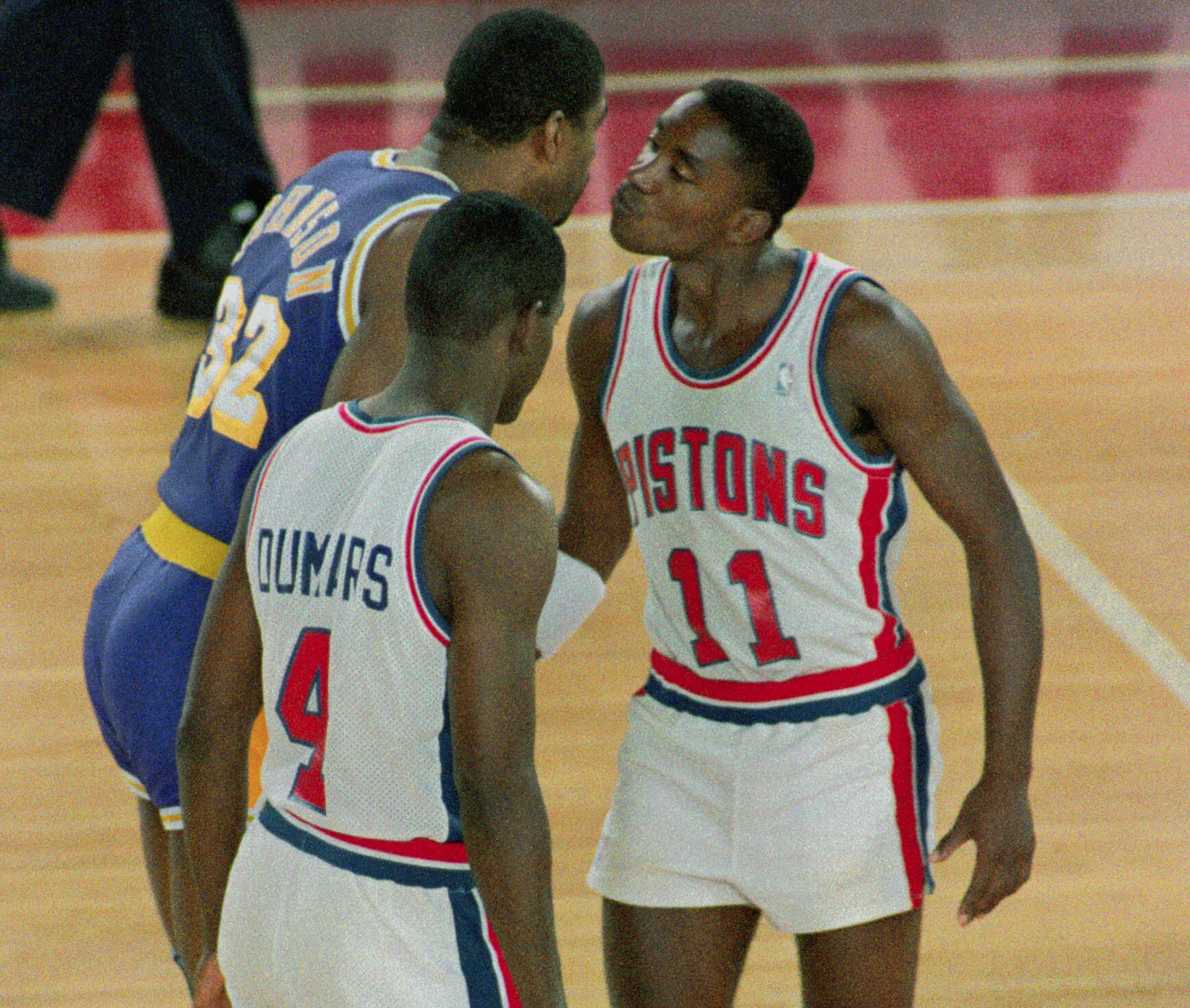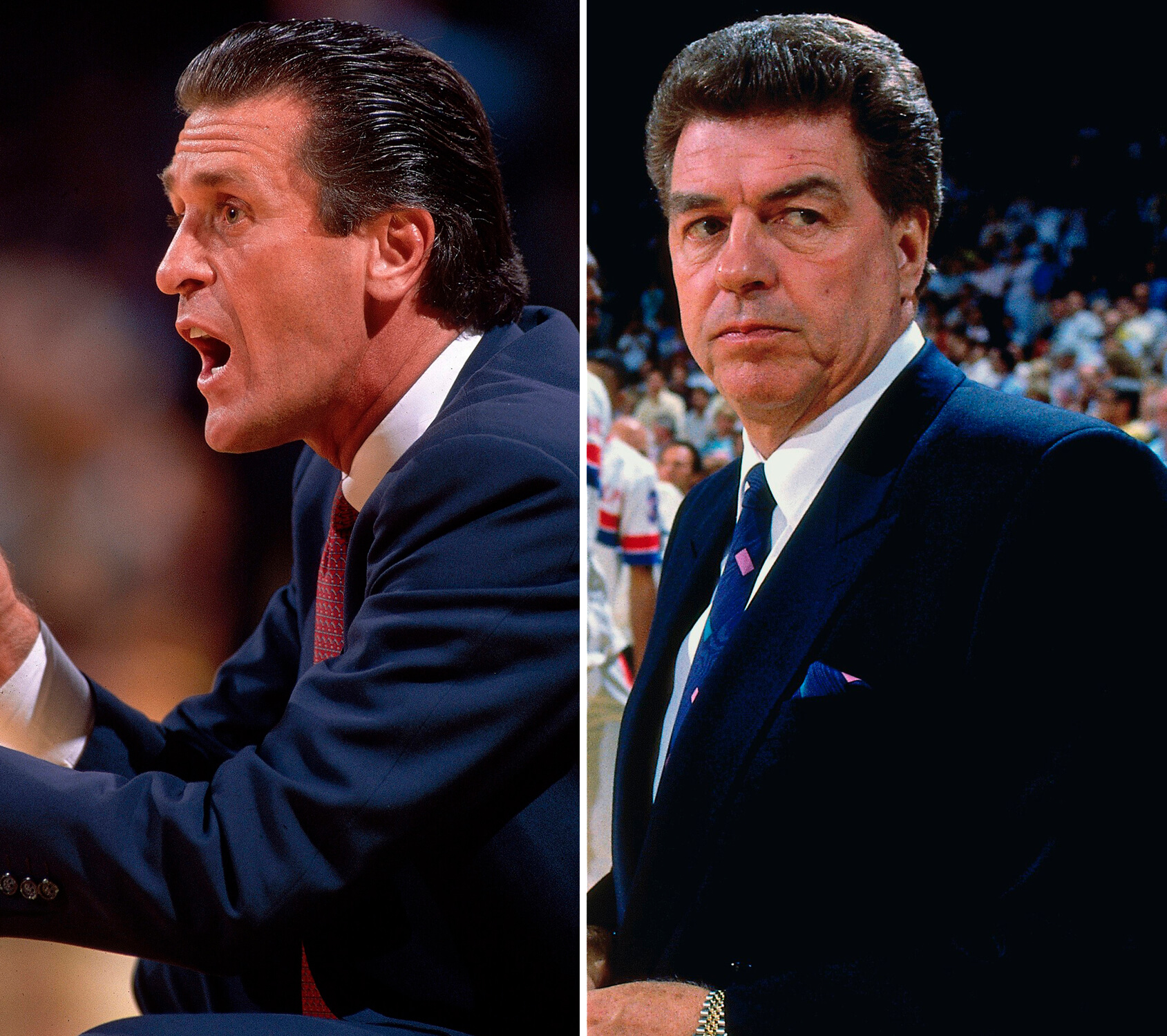BONUS CONTENT/FEATURE STORY
When the Game Was War
The NBA’s Greatest Season
By rich cohen

FOR MANY PROFESSIONAL basketball purists, the NBA reached heights of artistry and drama in the 1987–1988 season rarely seen before or since.
The game was riding a wave of popularity that had begun several years earlier with the arrival of two iconic rookies: Larry Bird of the Boston Celtics — “Larry Legend,” as he was known — and, for the Los Angeles Lakers, Earvin “Magic” Johnson. It was about to be propelled to even greater heights by the Chicago Bulls’ Michael Jordan, who continued his dazzling ascent that year, though he was not quite ready for the summit.
Over the course of a bruising 82-game regular season, rivalries that were already intense grew white hot, and in some cases became ugly.
All of that was sorted out in a series of playoff rounds that steadily ratcheted up the tension. Jordan’s bid for an early championship was snuffed out by a group of tough, blue collar “Bad Boys” from the Detroit Pistons, led by their lightning quick point guard Isiah Thomas — known by friend and foe alike as Zeke. Then Detroit ended Bird and Boston’s bid to return to championship glory.
That put the Pistons into the NBA finals, where they would face the elegant, Hollywood-worthy Lakers, led by the charismatic Magic. The contrast between the teams — and their cities — could not have been more striking. The stage was set for high drama.
In this excerpt from veteran writer Rich Cohen’s new book, the teams meet to kick off a seven-game championship round that would become part of the sport’s lore.
FOR MANY, A PISTONS VS. LAKERS final seemed like an Isiah vs. Magic final. They’d been friends since they were kids. Fellow high school standouts in the Midwest, they’d first met in dimly lit gyms and on the sidelines of all-star tournaments. Magic advised the younger Isiah on the big transitions — from high school to college, from amateur to pro. He mentored Zeke, vacationed with Zeke, schooled Zeke in games of one-on-one played behind Magic’s mansion in the shadow of the San Gabriel Mountains.
Magic taught Zeke how to order food, how to eat sushi, how to tip a waiter, and how to tie a Windsor knot. He taught him how to win and taught him how to lose. He celebrated his successes and put his failures in perspective. He talked him down when he’d screwed the pooch. He wanted the best for his friend. He’d often said he couldn’t wait for Isiah to become an NBA champion. You can’t imagine what it’s like, he told Isiah. You don’t know until it happens. But now, if he was being honest with himself, he had to admit that the only thing worse than losing in the finals might be losing in the finals to Isiah, which would be like losing to your little brother. For the first time in their friendship, they’d face each other in a zero-sum game. Here’s what that meant to Magic: For me to be happy, my friend must suffer.
The press made a careful study of the relationship. There were similarities and differences. Magic and Zeke were both finesse players and team leaders who could contribute without scoring. Both were characterized by their contagious smiles. Both were Midwesterners, and both played point guard. Whereas Magic was too big for the position, Isiah was too small. It was only determination, that Nietzschean will, that let Zeke play as big as anyone. Magic seemed genuine, like a truly good guy, a perfect representative of Hollywood and the Showtime Lakers. Isiah was not like that. Isiah smiled but the smile was a mask. It hid more than it revealed. He’d cut you to ribbons and leave you bleeding on the floor, in which case the smile only added to the pain. He seemed disingenuous, a perfect representative of post-industrial Detroit and the Bad Boy Pistons. Though they vacationed together, talked into the night on the phone, and played horse on Magic’s palm-fringed Bel Air court, neither lost sight of the goal: Bury the other man and walk away with the crown.
They met at center court before every game of the finals, exchanged pleasantries, then kissed — lips to cheek, Parisian style. The kisses grew increasingly perfunctory as the series developed and the bad blood flowed, but never stopped. Their teammates razzed them — Don’t kiss the enemy before battle! — but Magic and Isiah were determined to prove they could remain civil without sacrificing the edge. But the tensions that would eventually end the friendship were already evident by 1988. Magic resented the way Isiah, backing up [teammate Dennis] Rodman after the loss in the 1987 playoffs, claimed that Bird’s stature in the league was due only to his race. In belittling Magic’s great rival, he was diminishing Magic. Ali isn’t Ali if Frazier is “just another good player.” And, by bringing race into it, Isiah was undermining all the work Magic had done to move the NBA from the fringe to the mainstream.
The L.A. media belittled Isiah and the Pistons in comparison to Magic and the Lakers. On the morning of Game 1, the L.A. Times sports section, which predicted a Lakers win in five games, was headlined: “It’s Magic versus his little buddy, Pocket Magic.”
According to CBS commentator Brent Musburger, the Pistons would be challenged not just by the Lakers but by the blinding awesomeness of the Hollywood scene, the glitz of the Fabulous Forum, the nightlife temptations and courtside celebrities. How could a hick like Dennis Rodman focus with Farrah Fawcett sitting right there? How could John Salley from Canarsie, Brooklyn — that’s the weeds, out where the mob dumps bodies — play beneath a bleacher full of faces from TV? “I met Sam Kinison!” Salley said after Game 1. “I met Billy Crystal! And Arsenio Hall! I love this town. Billy Crystal was sitting two rows from our bench, and I was like, ‘Hey, what’s up, Billy Crystal?’ He was sitting with Garry Shandling, the white guy with the big lips.”
When Musburger ran through story lines before the opening tip, it sounded like a Sopranos recap: “Let’s start with the Lakers. Without a doubt, they are the team of the ’80s. They have won four championships. The drive for five is only four victories away. And there is another goal for this team. If they win this one, they will become the first team since the Celtics in ’68 and ’69 to win back-to-back NBA championships. For Detroit, the issue is one of emotion. Did they [already] achieve their goal by beating Boston? Or can they climb back emotionally and recapture that spirit against the Lakers?”

The Los Angeles Lakers’ Magic Johnson (left) and the Detroit Pistons’ Isiah Thomas were rival point guards during the 1988 NBA FInals.
GAME 1
AT THE START OF THE game the Pistons, gathered around [Head Coach] Chuck Daly beside their bench, let out a communal cheer, then ran onto the floor. [Pistons center Bill] Laimbeer came out with his head down. The Forum was a few miles from his high school. He returned with an air of defiance and played angry from the first minute. Predictions that the Lakers would win the series in five games, or even in a sweep, infuriated Laimbeer.
Detroit had played a half-court game against the Celtics, but Chuck Daly sent his team into Game 1 with a different plan. The Lakers were known for speed, but the Pistons were younger and just as fast. They came out running, meeting speed with speed on one end and wrenching defensive pressure on the other, employing a full-court press early. The Pistons were like an upstart nation trying to shock a superpower with a quick surprise, a blitzkrieg. Hit ’em with everything, and see what happens.
Laimbeer battling [Lakers center Kareem] Abdul-Jabbar was a matchup that would define the series. Laimbeer did his best to muscle Abdul-Jabbar, who was 4 inches taller. On play after play, you’d see Kareem, back to the hoop, leaning against Laimbeer’s forearm. “I can’t block him,” Laimbeer explained, “so I just try to push him into no-man’s-land and hope he misses when he shoots.”

Lakers Head Coach Pat Riley (left) and Pistons Head Coach Chuck Daly. Both men are Naismith Memorial Basketball Hall of Fame inductees.
Kareem went 1 for 8 in Game 1. Everything else worked for Detroit too. [Shooting guard Joe] Dumars hit his jump shots. Isiah set the tempo and drove the lane. Laimbeer was perfect from the outside. [Forward Adrian] Dantley was having what Isiah described as “his best game as a pro.” “During the season we had given [Dantley] the nickname ‘Teacher’ because he so often takes his opponent to school,” Isiah explained. Well, he schooled the hell out of the Lakers that night, Isiah said, making 14 of 16 field goals and scoring 34 points.
The Pistons started the game with an 8–0 run, sucking the energy out of the Forum. Even the Laker Girls looked flat. At one point, [Lakers forward James] Worthy collided with Laimbeer and fell, landing on his hip. Worthy’s howl of pain could be heard in the upper level.
Then the starters gave way to the second teams. The Lakers had a good second team — Mychal Thompson, Wes Matthews, Kurt Rambis — but Detroit’s was better. [James] Edwards, Salley, Rodman, Vinnie Johnson. No one in the league could match that bench.
As often happened, Vinnie Johnson — the “Microwave” — caught fire as soon as he entered the game. On such nights, it looked like he was just having fun, like he was back in Brooklyn where he used to ride his bike for miles in search of a game. He stayed on when the starters returned. He dished the ball cross-court to Laimbeer, who hit a 3-pointer from the corner. Perhaps because there were only 4 seconds left in the half, Kareem inbounded lackadaisically. Isiah picked off the pass, turned, and jumped, releasing a rainbow that dropped for another 3 as the horn blew. Six points in seven seconds. Detroit went into the locker room with a 17-point lead.
Worthy was back for the second half, which made a big difference. The Pistons had trouble containing Worthy’s mix of power, intelligence, and speed. It was only his retiring nature, his life in the shadows — first of Jordan at UNC, and then of Magic in L.A. — that kept Worthy from being rated among the top 25 to ever play. He might have paled a bit in the regular season — he tended to fade in the dog days of January and February — but played his best, and about as well as anyone has ever played, in the playoffs, when it mattered most, a classic mark of excellence. Great teams need at least two great players. The second of those two usually dims in proximity. For the Bulls, that was [Scottie] Pippen. For the Celtics, it was [Kevin] McHale. For the Lakers, it was Worthy. Without “Big Game James,” Magic does not become Magic, and L.A. is not Showtime.
The Pistons continued to win the hustle plays. Rodman blocked shots. Isiah scored over and under Byron Scott. Vinnie Johnson torched Lakers guard Michael Cooper, whom many, including Bird, considered the best defender in the league. “I think the Lakers need a little nudge, a scare, before they can get their game going,” announcer Dick Stockton said on CBS. “Maybe that’s the function of this game. To scare the Lakers. The way of the format, if they don’t get it together, they might never get back to the Forum.”
The arena had emptied by the end of the fourth quarter — that’s L.A. too.
“The Pistons have done to the Lakers what they did to the Celtics,” Dick Stockton said. “They landed the first blow and shocked the world champions.”
Final Score: Detroit 105, L.A. 93.
“We are for real,” Adrian Dantley said after the game. “Everyone was expecting us to lose in four or five. We got guys that are hungry, we got some character. We know they are favored, but we gonna give them a fight.”
Excerpted from When the Game Was War: The NBA’s Greatest Season by Rich Cohen, copyright © 2023 by Tough Jews, Inc. Used by permission of Random House, a division of Penguin Random House LLC, New York. All rights reserved. No part of this excerpt may be reproduced or reprinted without permission in writing from the publisher.
Rich Cohen is the author of the New York Times bestsellers Tough Jews; Monsters: The 1985 Chicago Bears and the Wild Heart of Football; Sweet and Low; When I Stop Talking, You’ll Know I’m Dead (with Jerry Weintraub); The Sun & the Moon & the Rolling Stones; The Chicago Cubs: Story of a Curse; and Pee Wees: Confessions of a Hockey Parent.
Photo credits, from top: Main image, clockwise from top left: Richard Mackson/Sports Illustrated/Getty Images; Manny Millan/Sports Illustrated/Getty Images; Andrew D. Bernstein/NBAE/Getty Images; Bettmann/Getty Images; Richard Mackson/Sports Illustrated/Getty Images. Magic Johnson/Isiah Thomas: Bettman/Getty Images; Pat Riley: Peter Read Miller/Sports Illustrated/Getty images; Chuck Daly: Andrew D. Bernstein/NBAE/Getty images